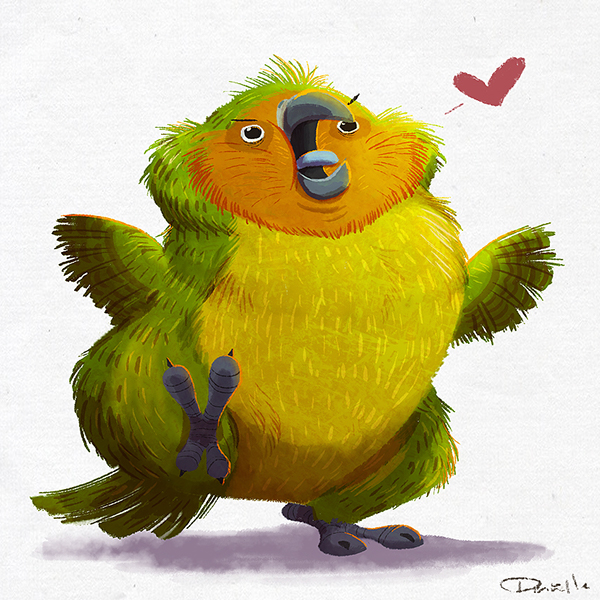Kakapo (5e Race)
Kakapo[edit]
| “ | You can't teach new tricks to an old dog, sire. Too bad that I am not the dog here. | ” |
| —Words attributed to Pardiun, the wizard, during her last duel | ||
From some of the hottest islands in the material plane, fat and isolationists; Kakapos are considered the pinacle of the flyless birds... by themselves. Separating themselves from other avian subraces by their own will, this race wants only one thing in life: to be powerful enough to be forever alone and to keep eating.
Physical Description[edit]

|
|---|
| Property of https://www.behance.net/daniellebrown |
Kakapos are small, flightless and incredibly robust avians. Green and yellow feathering offer excellent camouflage in wooded and tropical enviorments, where they prefer to live, with very limited variations. Their hands are hidden under their specially fluffy feathering, reserving them until they are indispensable. Their black eyes guide their beaks while using them as a hook when climbing. What they lack in flight they make up for in a very quick movement speed and their innate abilities to climb even difficult places.
History[edit]
Originally from isolated tropical islands, around 1000 years ago some of them started migration to conquer other lands. While military incursions were pretty much fruitless because of their scarce numbers, most races found their resiliance and cognitival abilities much more useful, offering them food and isolation in exchange for some intellectual work. This migrants and their descendants tend to be less isolated than the average kakapo, but they still prefer to be left alone. Now a days they are found in most port cities or ship crews as accountants or book keepers, even though they tend to be few in number. When found away from ports, they are often found in simple farming areas, rarely more than 2 or 3 families with 3 or 4 members at most on each in close contact.
Society[edit]
Originally found in small, peaceful tribes that have, at most, 10 members. Since their "conquest of the world" failure there is rarely any conflict with the outside world. In fact, some tribes even welcome and help travelers. Chiefs are chosen by the elders, usually choosing the wisest or the strongest, depending on the situation the tribe is having. Chiefs last one year and then they can be changed or the elders give them the continuation. If one chief lasts 5 years in continuum, he is considered chief until death. This tribal societies usually produce small amounts of products: dried fruits and, ocassionally, meats; feather ornaments and some herbal medicines are products they give for darts and tools.
Kakapo Names[edit]
Kakapo normaly use names that sound exotic and combine particles from various languages. They usually get only one gender neutral name with no surnames. They rarelly get a title, but when they do this title is considered their name until they lose it.
Unisex Absille, Burnow, Cassionme, Divos, Elelliun, Firenall, Geines, Hilliq
Kakapo Traits[edit]
| Flightless birds with isolation tendencies Ability Score Increase. Your Dexterity score increases by 2 and your Wisdom score increases by 1. Age. Kakapos reach maturity at 5 years of age, and live to be about 60 years old Alignment. Kakapos are often in the good side of the expectrum. They have rarely a chaotic or lawful nature. Size. Kakapos very rarely are taller than 4 feet tall. Your size is Small. Speed. Your base walking speed is 30 feet due to your strong Kakapo legs. Your climbing speed is 30 due to your specialized beak. |
| Low Metabolism. Even if you eat a lot, your metabolic rate is naturally very slow. Poisons takes twice to take effect and last double the time, but you have resistance to their effect. For starvation rules you can add your proficiency bonus to the number of days you can resist without eating and drinking. |
| Fluffy. You are proficient on Sleight of Hands. Your unarmored AC is 10 plus your CON modifier since your fluff cushions most blows. Upon receiving fire damage your natural AC will drop by 1 each time you get hit with fire damage. You recover one point of your natural AC once every long rest. |
| Isolation. You are proficient on the Survival skill. |
| Languages. You can speak, read, and write Common, Auran and one language from the nearest port city of your choice. |
Back to Main Page → 5e Homebrew → Races
